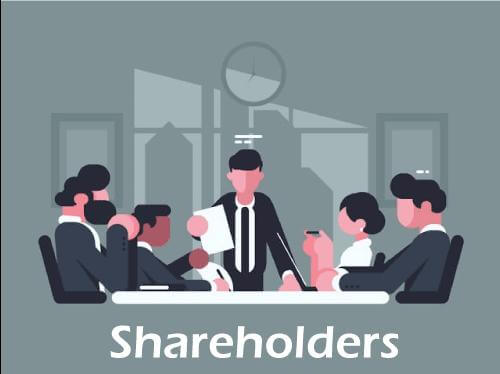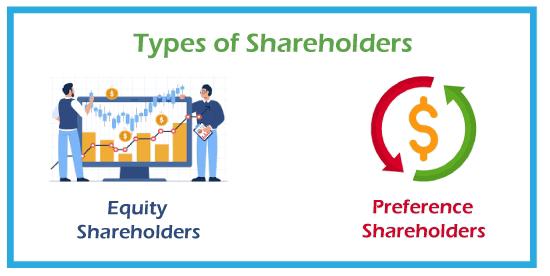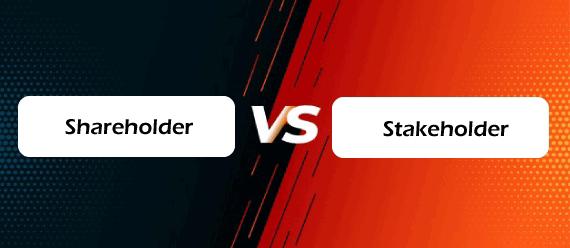ShareholdersWhat Is a Shareholder?A person, company, or institution that holds or owns at least one share of a company's stock, is known as a shareholder or a stockholder. Shareholders are the actual owner of a company because of which they also enjoy the benefits of the business' success and growth. These benefits or rewards are received in the form of increased validation of the company's stocks or financial profits that are distributed as dividends. 
Conversely, the price of the shares falls if the company suffers a loss. It can cause declines in the shareholders' portfolio or simply they can lose their money. The proportion of the Shareholders' holdings in the company's shares is responsible to determine their influence of them over the business. A point should be noted here that a company's shareholders are legally distinct from the corporation itself. They are not advisable for the organization's obligations and also their liability to the debts of the business is just limited to the unpaid share price unless guarantees are not provided by the shareholders. So, it can be said that a company is only obligated to record the beneficial ownership of a shareholding on the register, not the beneficial owner. In the case when there is more than one person listed as the owner of the shareholding, it is assumed that the person who was first listed as the owner will get the control of shareholding and an exclusive communication will take place between that person and the company. The Rights of ShareholdersThere are certain rights that are given to the shareholders as per a company's charter or by-laws. They include the followings:
Roles of a ShareholderA shareholder not only receives a share in the company's profit but also plays several responsibilities. Some of them are given below:
Types of ShareholdersA beneficial shareholder is a person or legal entity who benefits financially from ownership of the shares, whereas a nominee shareholder is a person or legal entity who appears on the corporation's register of members as the owner but, in reality, acts for the benefit or at the direction of the beneficial owner, whether or not the beneficial owner is disclosed. 
There are primarily two sorts of shareholders: 1. Equity ShareholdersOrdinary shareholders are individuals or legal entities who own ordinary, common, or equity shares of a firm. This is the most frequent type of stock ownership. Ordinary shareholders have the right to participate in general meetings of the company and the election of directors, as well as the ability to launch class action lawsuits when necessary. 2. Preference ShareholdersOwners of preference shares are known as preference shareholders. They receive a predetermined dividend rate, which takes precedence over the dividend due to ordinary shareholders. In most cases, preference shareholders do not have voting rights in the corporation. Importance of ShareholdersCompany Operations Shareholders play a direct and indirect involvement in the functioning of a corporation. They choose directors who select and manage senior officials, such as the CEO and CFO. Through the stock market, they play an indirect role. Investors avoid companies that fail to meet earnings projections and instead invest in stocks that routinely outperform them. As a result, firm management is constantly under pressure to reach and exceed sales and profit targets. Shareholders typically press companies that generate considerable free cash flow to return part of the extra cash to them in the form of dividends or share buybacks. Financing the Company Shareholders are the prime source of the finance for the company. Various start-ups and private companies can also raise funds by private placements and issuing shares to select individuals and institutions. Additional funding may be provided by the founders of a startup firm, including venture capital backers, in exchange for a bigger proportion of ownership. Shareholders, unlike bond investors, do not get recurring interest payments or a return on their initial investment. Governing the Company Formal corporate governance policies, such as the makeup and duties of various board committees, the chairman's role, and codes of conduct and business ethics, are normally in place in public firms. Shareholders, not management, are the ones who answer to boards of directors. Shareholders must get timely and complete information from public corporations. Each quarter, senior executives spend a few days with shareholders, market analysts, and the business media to review operations and general business circumstances. The chief executive and chief financial officer sign financial records, making them responsible for any mistakes or omissions. Control Over the Company A public company's control is usually determined by its shareholders. A corporation with a large number of shareholders and no single majority shareholder is vulnerable to hostile takeover attempts. Shareholders can object to such moves if they are happy with the current management or believe the offering price is too low. Institutional shareholders have the right to openly demand that management examine strategic options such as selling the firm or merging with another. Post-Transaction Disadvantages of Remaining a ShareholderThere will almost certainly be limitations on the stock you currently hold. Management rolling equity back into the company is preferred by private equity buyers because it keeps staff focused on the company's long-term performance. There will be restrictions on your ability to transfer that stock as a result of this, as well as to avoid unusual shareholder complications. It may be possible to transfer the stock into trusts for estate planning purposes under some agreements, but you will not be able to sell your shares at will. You may have a different stock class than the private equity firm. Many private equity buyers would structure the transaction so that the management team or seller receives ordinary stock while they acquire preferred stock. This means that in the case of a liquidity event, they would be paid in full before the common shareholders. Consult your tax advisor before requesting preferred stock in your transaction. Any tax savings you gain as part of rolling equity may be negated if you choose a preferred structure. There will be rights to drag-along. While the concept may sound primitive, what it means is that if your private equity partner has decided to sell the company, they can force you to sell your shares as part of the deal. They don't want your equity to prevent them from selling your home in the future. As a result, the management shares are "dragged" along with the transaction. The fact that you possess something does not always imply that you have control over it. Even if you own stock in the company, you might not get a seat on the board. Even if you do, you won't be able to make significant modifications without the new owners' permission. Private equity firms want your investment for the company's success in the future but along with this they also want your involvement in decision-making about the company's direction, new employees, and other business matters. These decisions are those in which the owner is facing difficulty to conclude. IRS and ShareholdersAs a shareholder, any gains that you make should be reported as income (or losses) on your tax return. According to the Internal Revenue Service (IRS), "Shareholders of XYZ corporations report the flow of income and losses on their tax returns and are assessed tax at their individual income tax rates. This allows the corporations to avoid the problem of double taxation on the corporate income. Also, tax on certain built-in gains and passive income at the entity level is the responsibility of XYZ corporation." Common V/s Preferred ShareholdersThere are mainly two types of shareholders in a company: common or equity and preferred. Generally, the common stocks are cheaper that's why the majority of the shareholders belong to this category. Here, the difference between these shareholders are given below:
Shareholders V/s StakeholdersThe terms shareholders and stakeholders are used interchangeably many times. But in accounting there are several differences between them which include the followings: 
Next TopicBasic Terms of Accounting
|
 For Videos Join Our Youtube Channel: Join Now
For Videos Join Our Youtube Channel: Join Now
Feedback
- Send your Feedback to [email protected]
Help Others, Please Share









